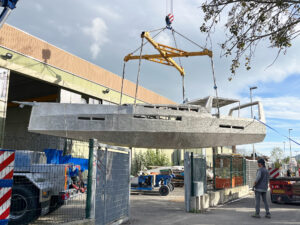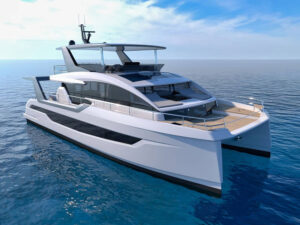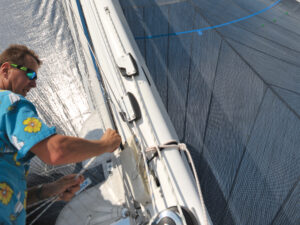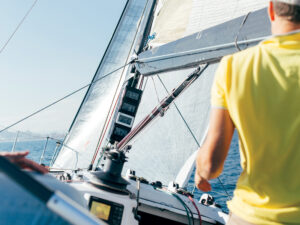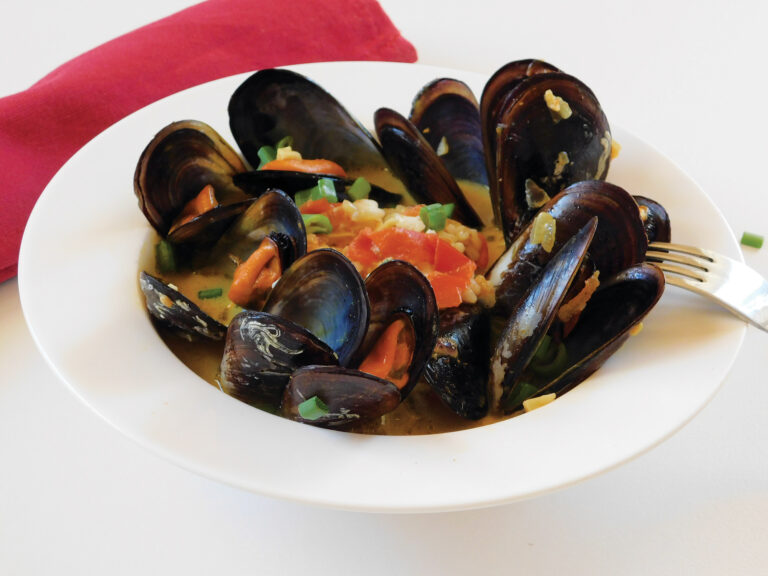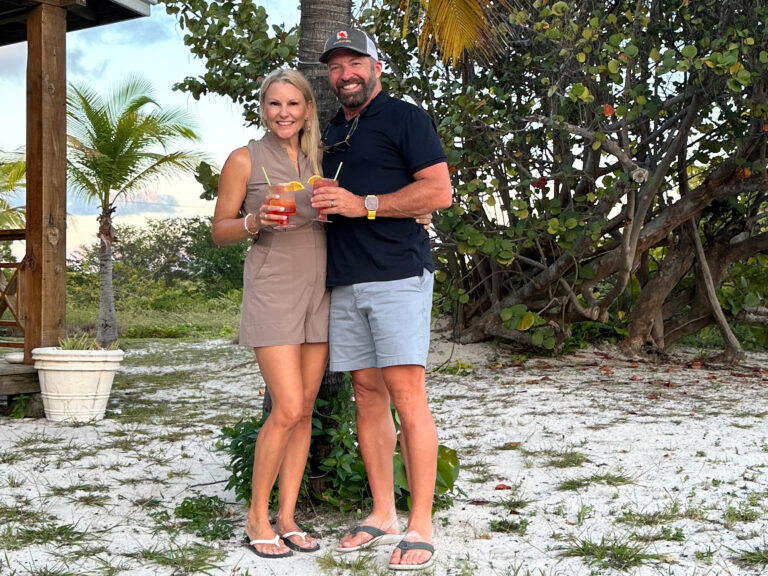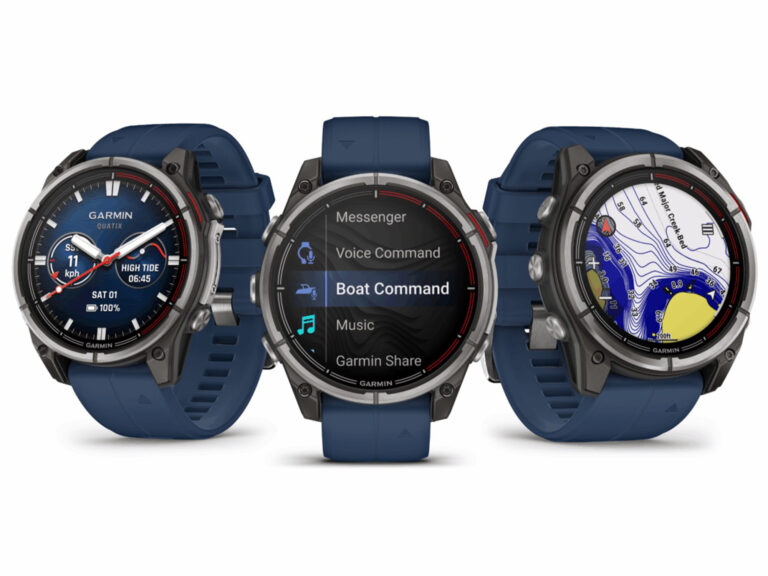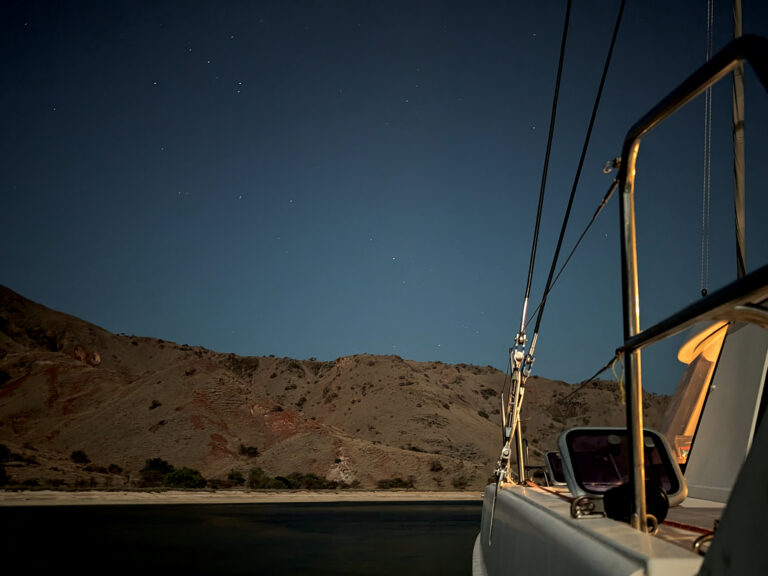
Fatty and Carolyn
Entering Florida’s Tampa Bay from seaward is always a treat. But on one occasion, before I sailed into my childhood home port of St. Petersburg, I first had to hand my light-air jib and clap on a smaller headsail with a higher clew to effectively drive to weather in the considerable chop.
The year was 1970. I was 17 or 18 years old, and Corina, my carvel-planked Atkin double-ender, was twice that age. Unfortunately, just as I’d doused the sail and was starting to go forward on the bowsprit to unhank it, Corina hit a wave in an odd way. The foredeck went out from under me. I started falling, and then the deck came rushing back up with savage intent. I fell on the bitts and I landed on my—what a man doesn’t want to land on.
After the initial pain swept over me, I didn’t think it was so bad. Nothing was bleeding, and no important parts of me had snapped off. I figured I’d be OK. But I couldn’t walk or stand. And the semi-doused jib was luffing crazily. So I slowly crawled back to the cockpit and said tightly to my future wife, Carolyn, “Your turn, babe.”
We managed to tie up at the St. Petersburg Municipal Marina transient dock just before dusk. At dawn, I still could only barely walk. Carolyn said, “I’m taking you to the hospital.” Carolyn rarely tells me what to do. When she does, I do it. Taxi fare would have been about $5 at the time. We had that much, but just barely.
Nobody was up yet around the marina. I could have waited until someone stirred and asked for a ride, but I was too proud to do anything that remotely resembled begging. (As a youth, I was even more ruggedly independent!) So we attempted to walk to the hospital. It wasn’t far. But I could only move a few steps at a time. At some of the major intersections, Carolyn put me on her back and sort of dragged me across.
Finally we made it, and I heaved a sigh of relief—and offered up a silent prayer of thanks to my loving, foresighted father. Even though he was on an extremely limited budget himself, he’d kept me on his medical insurance policy at great expense “so that anywhere in the world you sail, son, you’ll be able to get good medical care without worrying about the expense.”
So I was flabbergasted to be turned away from the hospital. I was a minor, lacked a certain signed parental form, and wasn’t bleeding or obviously dying. The hospital couldn’t help me. (Note: This was long before the Internet and fax machines were commonplace. And I couldn’t even call my father because he was cruising on Lake Michigan on his new steel sloop,_ Panique_.)
I won’t forget limping out of that hospital and sitting painfully down on its steps and saying to Carolyn, “Boy, ain’t it lucky my father has been paying on that insurance policy all these years, eh?”
Later in the day, I went to the “sailing doc” in town who correctly diagnosed me as having a torn sartorius muscle and told me that I’d heal nicely if I just stayed off it.
A month later, when I finally got my father on the phone, I told him to cancel the worthless policy, and I’ve never had insurance since.
But that doesn’t mean we don’t think about our health as we voyage about. The best offshore sailing advice I’ve ever received is to be careful, minimize risk, be cowardly, don’t take needless chances, and, finally, duck!
But things tend to happen, regardless of whether you’re ashore or afloat.
We were anchored off one of the loveliest, most picturesque island capitals in the world, Plymouth, Montserrat. (Needless to say, this was before the volcano buried it under a billion tons of dust.) We were aboard Carlotta, our 36-foot ferro-cement ketch, and cruising in the company of the lovely 50-foot ferro-cement ketch Perseverance—vessels that had been constructed in the same boatbuilding commune in Boston and were now crossing the Caribbean in happy company.
Carolyn was baking a cake aboard Carlotta for somebody’s birthday. We never made the party. It was one of those accidents that was almost impossible, yet happened. The anchorage off Plymouth always has a persistent roll from the trade-wind swell that works its way around the southern tip of the island. Carolyn was squatting while taking the cake out; the door was only open for a second or two. Our daughter, Roma Orion, and I were on the other side of the cabin. Suddenly Roma, who was just a toddler, stood up. And she unexpectedly started to lurch across the cabin. I yelled and tried to lean over to grab her. I missed. Carolyn saw her coming and attempted to push her away with a body block, to no avail. Roma evaded both of us and planted her little, pink hand firmly on the 425-degree open oven door. Nothing happened for a second—and then she got the saddest look on her face.
Within moments, her hand was puffed up to three times its normal size. Luckily, one of the crew aboard Perseverance was a registered nurse, and our first-aid kit was well stocked. We huddled over our dog-eared Merck Manual of Medical Information. Burns are incredibly painful, but the immediate danger is infection. We considered evacuating her by air to a burn unit in Miami, damn the expense.
In the end, we changed the dressing religiously while kissing away her tears, and she healed nicely.
While cruising in Thailand in 2002, I’d been scuba and skin diving almost every day for a month when I got a severe ear infection. It was painful, and I immediately went to the emergency room of the Phuket International Hospital. Within minutes I was whisked in to see a smiling doctor and strapped to modern, high-tech machines for tests. I was impressed. The doctor knew my problem exactly, explained it to me carefully, and even gave me some pertinent printed material to read later. Then he gave me pills to knock out the infection and other pills for the pain.
The only problem came at the end, when I went to pay. They wanted my Thai health card. I told them that I didn’t have one. Because I was a visitor, they asked for my Blue Cross Blue Shield card. I told them I didn’t have that, either.
“Then what are you going to do?” the billing nurse asked me.
“Pay cash,” I said.
“For the doctor, all of the tests, the E.R. charges, and the medication, you’re going to pay cash right now?”
I gulped. I always wear a belt with a hidden compartment. I was pretty sure I had at least US$500 with me and about half that in Thai baht.
“Yes,” I said.
“OK,” she said and added it up. It came to US$12, total. For once, I didn’t complain about the price.
On Day 18 of our first Pacific Ocean crossing in 2000, I was on watch, sitting in the cockpit at midnight and marveling at the majestic waves. Then we hit what I call a pothole—an empty place in the ocean. Wild Card fell, then was thrown skyward and sharply rotated to port. I heard heavy things shift belowdecks. Worse, I heard something that sounded like a watermelon being dropped on concrete.
I threw open the hatch. There was blood, a lot of it. Carolyn and her mattress were on the wrong side. She was holding her heavily bleeding face and shouting, “Is it broken? Is it broken?” Since we were not in heavy weather and she had been sleeping on the low side, she hadn’t put up the lee cloth.
I leaped below and said, “Let me see.” She took away her hands, and I gently shifted the loose flap of skin at the bridge of her swollen nose. My hands were trembling. I could see something whitish through the river of blood, like cartilage or bone. I tried not to throw up. “Hmm,” I said, hoping I sounded a bit like Marcus Welby, M.D.
Out came the medical kits. We were corkscrewing like mad down the Pacific swells. With a bright LED headlamp on my forehead, I thoroughly washed the split area, dabbed it with disinfectant, and then gingerly smoothed a butterfly bandage over her nose.
It was a full-moon night, and it was eerie to attend to her with the pale moonlight sweeping the gyrating interior. She tried to wiggle her nose, and then she nervously asked again, “Do you think it’s broken?”
I shined my headlamp on the bloody splotch where she’d hit the varnished bulkhead and let it linger there. “Don’t worry,” I said. “We can revarnish it.”
There was a pause.
“Bastard,” she said and started to laugh. I laughed, too. Soon we were both laughing like maniacs to chase away our fear.
In a lifetime of offshore cruising, Carolyn and I have together spent only a few thousand dollars on health care, excluding dentistry, along our watery way. World cruising is a very healthy lifestyle if you stay out of the cowboy bars and opium dens. We’ve been lucky as well as careful. I must admit that most doctors have been wonderful to us, despite our cringing wallets.
I’m also aware that this might change. I’m in my late 50s now, and I’ll probably require more health care in the future than I’ve needed in the past. One single day in a modern American hospital would wipe out our entire life savings. But that day hasn’t come—yet. And I’m wise enough not to ruin my wondrous watery existence by worrying too much about tomorrow, especially since today is the best day of my life.
To celebrate completing the first draft of their upcoming book Red Sea Run, Cap’n Fatty and Carolyn Goodlander cruised along the south coast of Turkey for 10 days with their daughter, Roma Orion.

